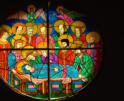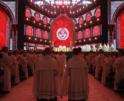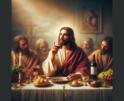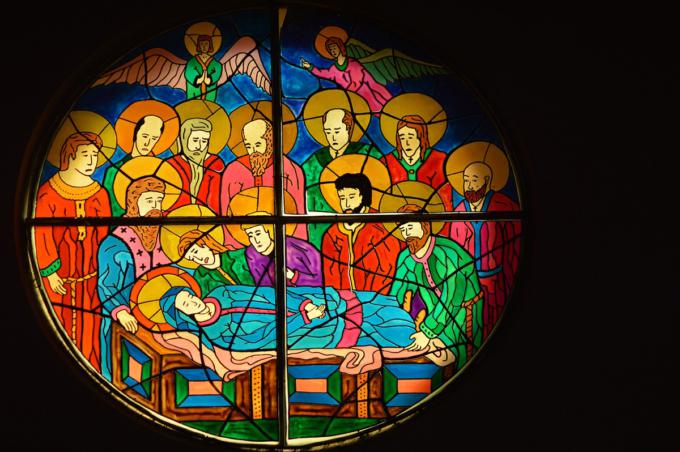
Culture
The argument is that death is a punishment for original sin, and the dogma of Mary's Immaculate Conception, her freedom from original sin, defined as dogma by Pope Pius IX in 1854, points to the conclusion that she would not have experienced the punishment for original sin -- death.
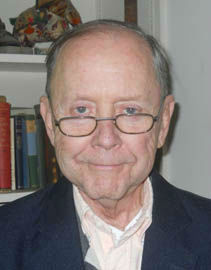
Shaw
"By the authority of our Lord Jesus Christ, of the Blessed Apostles Peter and Paul, and by our own authority, we pronounce, declare, and define it to be a divinely revealed dogma: that the Immaculate Mother of God, the ever Virgin Mary, having completed the course of her earthly life, was assumed body and soul into heavenly glory."
With those ringing words nearly 74 years ago, Pope Pius XII infallibly defined as a matter of faith the event we celebrate every Aug. 15 as the feast of Mary's Assumption. The Catechism of the Catholic Church hails it a "a singular participation in her Son's Resurrection and an anticipation of the resurrection of other Christians" (CCC 966).
Pope Pius's action on Nov. 1, 1950, was one of the major events of the Jubilee Year that had begun the previous Christmas and was soon to close at Christmas of 1950. Coming as it did only five years after the end of World War II, the Jubilee signaled the Holy See's emergence from the dark wartime years.
In the document accompanying the formal definition of the Assumption -- an apostolic constitution called "Munificentissimus Deus" (the most bountiful God) -- Pius XII recalled that before acting, he consulted all the bishops in the world and nearly all supported the idea of a doctrinal definition. The document itself devotes several pages to Fathers and Doctors of the Church, previous popes, and distinguished theologians who over the centuries had declared their own faith in the Assumption.
Note, by the way, that in saying the Assumption took place after Mary "completed the course of her earthly life," the formula of the dogma carefully avoids expressing any judgment on a debated question: Did Mary die? While it's commonly thought she did, some believe -- and are free to believe -- that rather than dying, she passed on by experiencing something like falling asleep (the word "dormition" is used to express that).
The argument is that death is a punishment for original sin, and the dogma of Mary's Immaculate Conception, her freedom from original sin, defined as dogma by Pope Pius IX in 1854, points to the conclusion that she would not have experienced the punishment for original sin -- death. But you're free to believe either that she didn't die or that she did.
In his document, Pope Pius also makes another point that's even more timely now than it was then. Citing Mary as an example of "the value of a human life entirely devoted to carrying out the heavenly Father's will and to bringing good to others," he adds this:
"Thus, while the illusory teachings of materialism and the corruption of morals that follows from these teachings threaten to extinguish the light of virtue and to ruin the lives of men, in this magnificent way all may see clearly to what a lofty goal our bodies and souls are destined."
And now? Now we live in a secular culture profoundly corrupted by sins of the flesh and actively engaged in promoting its evil values among children and young people. The results are apparent in things like the breakdown of marriage and family life and the spread of deliberately chosen childlessness. According to the Centers for Disease Control, a 2021 study found 20.7 percent American high school students to be sexually active at that time. Unrelated (perhaps), nonmarital childbearing rose from 399,000 in 1970 to 1,464,000 in 2021.
The Litany of the Blessed Virgin asks of Mary: "Queen assumed into heaven, pray for us." Amen to that.
- Russell Shaw is the author of more than twenty books. He is a consultor of the Pontifical Council for Social Communications and served as communications director for the U.S. Bishops.
Comments
Comments Policy
Recent articles in the Culture & Events section
-
The meaning of the Assumption nowRussell Shaw
-
The extraordinary ripple effect of Boston's Good SamaritanMary Myers and Jim Walsh
-
Is every Sunday a wasted opportunity?Greg Erlandson
-
God's plan and American politicsRussell Shaw
-
Scripture Reflection for Aug. 4, 2024, Eighteenth Sunday in Ordinary TimeDeacon Greg Kandra

